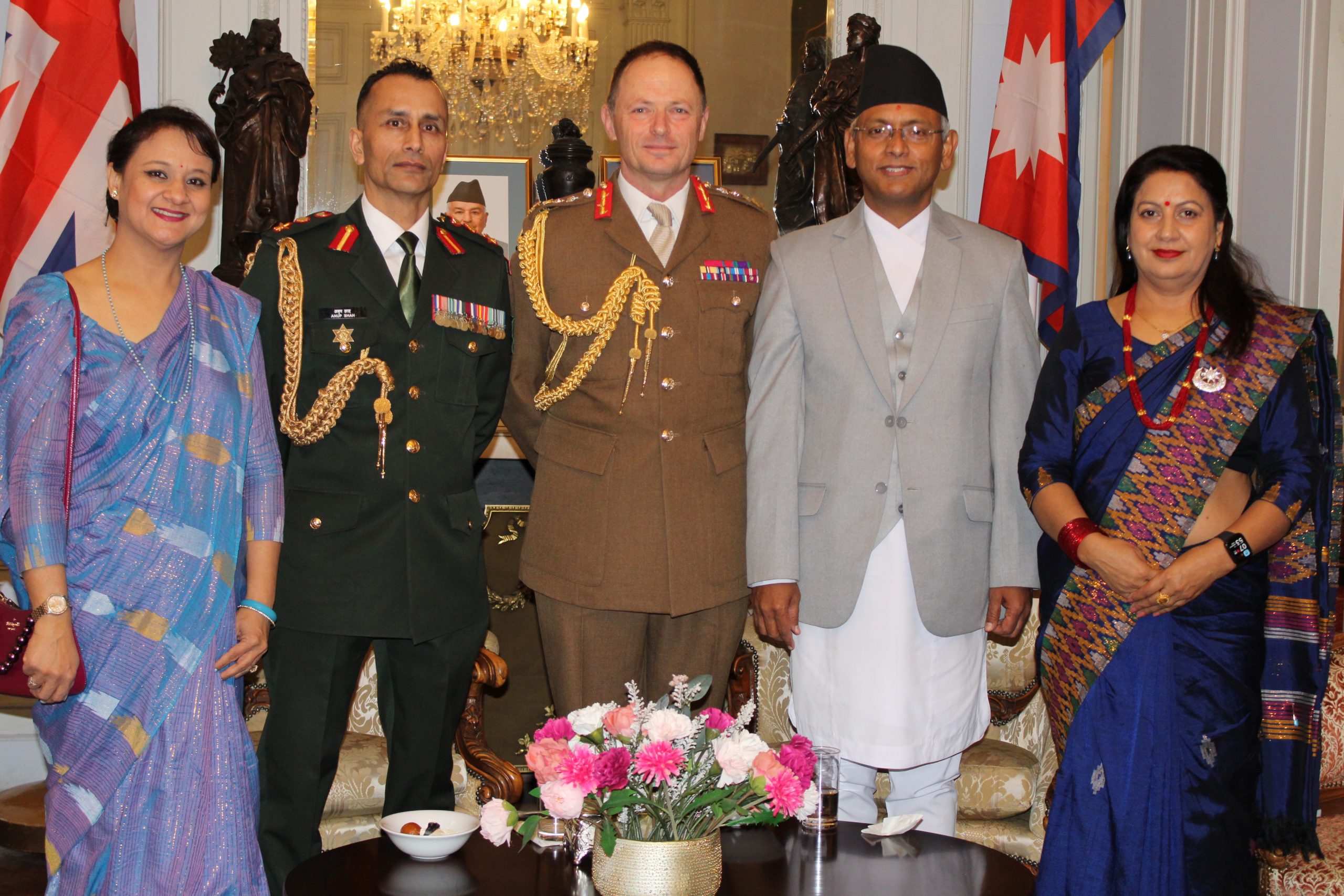SAT Round Table: Call for respect to human rights to ensure equitable development

London—Nepali academics and entrepreneurs have called for adopting ethical business practices
and promoting human rights so as to ensure equitable development. They have also called for
urgent action to ensure quality higher education in the country.
 Addressing a ‘Round Table on Business, Development and Human Rights in Nepal’ organised at the
Addressing a ‘Round Table on Business, Development and Human Rights in Nepal’ organised at the
Holy Cow Fine Dining at Putney on Sunday, Nepal’s envoy to the UK, Dr Durga Bahadur Subedi, called
upon Nepali academics based in the UK to carry out research work to highlight over 200-year-old
relations between the two countries. He said with the promulgation of a democratic constitution
and stable governments in the centre and provinces, Nepal is now ready for investment.
Making a presentation on the theme, “Privatisation in Higher Education in Nepal,” Assistant Dean
(International) at the Huddersfield University, Prof Padam Simkhada, said ,“ A total of 121 thousand students are studying in public universities in Nepal while 65 thousands Nepali students are studying in Australia alone. While the issue of corrupt practices have been reported in the medical education, similar practices in other disciplines are not being discussed publicly.”

Prof. Simkhada said that some 128,000 students were studying in private colleges in Nepal so it won’t be prudent to undermine their role in the country’s higher education. He, however, called upon the Nepal government to increase investment in the higher education sector.
He proposed that private colleges in Nepal should be allowed to run their own University like the Harvard University of the USA. “This will allow private colleges to develop their own innovative courses, help fulfill demands of local market and stop outflow of students as well as huge chunk of scarce foreign currency.”

Making a presentation on the theme, “Women politicians and political quota in Nepal: Challenges to women empowerment in a patriarchal society,” Research Fellow at the Institute for Risk and
Disaster Reduction of the University College, London, Dr Punam Yadav, said, “Women’s participation in Nepal’s politics is improving. However, they still face challenges to break the glass ceiling.” Dr Yadav said that 41 percent of all elected posts in local bodies were held by women but most of them were given deputy positions. “Women in local bodies are still learning, hence there is the need for more empowerment and awareness.”
 Similarly, making a presentation on the theme, “Transfer of skills for good business practices: A case for Nepal,” President of the Britain-Nepal Chamber of Commerce (BNCC), Dr Kapil Rijal, said, “There are lots of ways to promote investment apart from FDI. However, issues like double taxation had caused problems to investors.” He also urged the governments of Nepal and the UK to sign Bilateral Investment Promotion and Protection Agreement (BIPPA) as soon as possible to facilitate investment from diasporaand British investors.
Similarly, making a presentation on the theme, “Transfer of skills for good business practices: A case for Nepal,” President of the Britain-Nepal Chamber of Commerce (BNCC), Dr Kapil Rijal, said, “There are lots of ways to promote investment apart from FDI. However, issues like double taxation had caused problems to investors.” He also urged the governments of Nepal and the UK to sign Bilateral Investment Promotion and Protection Agreement (BIPPA) as soon as possible to facilitate investment from diasporaand British investors.

Making a presentation on the theme, “Climate Politics: How Nepal can protect and promote its
interests,” Environment Correspondent of the BBC World Service, Navin Singh Khadka, said, “Nepal is sandwiched between the world’s first and third largest carbon emitters (China and India) and is facing adverse effect of climate change.”
Mr Khadka said international negotiations were mostly focussed on carbon emission cuts and the issue of adaptation was put on the back burner. “Least Developed Countries like Nepal need to bring adaptation high up on the agenda, although mitigation or drastically cutting down CO2 emissions should be equally crucial.” He said Nepal’s immense water resources are serving as renewable energy source, particularly for major carbon emitters in the immediate neighbourhood. Nepal’s forests are playing a key role in the fight against climate change. Updates on Himalayan ecosystem are being used to assess the health of the planet. “Energy is at the centre of climate politics and it is mainly big economies’ game. The impact of climate change is here to stay. The challenge is how to live with it,” he added.

Making a presentation on the theme, “Ethical business practices and impact on Development: A case study of Nepal,” Executive Director of the Himalayan Developmetn International, Prakash Khanal, said, “Companies that work to build and maintain ethical workplace cultures are more financially successful and have more motivated, productive employees. Promoting ethical business practice is one of the key issues to improve Nepal’s business sector in order to eliminate corrupt practices.“
 Moderating the presentations, Executive Editor of www.southasiatime.com and President of theInternational Solidarity Forum Nepal, Dr Krishna Upadhyaya, said, “Development, entrepreneurship and human rights are inter related. The coordination and cooperation of all stakeholders alone can promote sustainable development. The key to promoting sustainable growth in business and development is to promote ethical business which will help to stop corruption. Elimination of corrupt practices itself promotes and conserves human rights.”
Moderating the presentations, Executive Editor of www.southasiatime.com and President of theInternational Solidarity Forum Nepal, Dr Krishna Upadhyaya, said, “Development, entrepreneurship and human rights are inter related. The coordination and cooperation of all stakeholders alone can promote sustainable development. The key to promoting sustainable growth in business and development is to promote ethical business which will help to stop corruption. Elimination of corrupt practices itself promotes and conserves human rights.”

In the first session of the program, former VP of the NRNA ICC, Kul Acharya, and President of the NRNA UK Chapter, Mrs Poonam Gurung, congratulated South Asia Time oncompletion of its first year and wished all success in the future.
 A total of £690.00 (approx. NRs 100,000) were also raised at the programme to support Maya Ghar—a Kathmandu-based organsiation that is providing shelter and education to disadvantaged children.
A total of £690.00 (approx. NRs 100,000) were also raised at the programme to support Maya Ghar—a Kathmandu-based organsiation that is providing shelter and education to disadvantaged children.

Full video of the program :
https://www.facebook.com/londonnepalnews/videos/600401837426199/
https://www.facebook.com/londonnepalnews/videos/460476898241237/
Photo Video : Shiba Bhandari, London Nepal News

















Facebook Comments